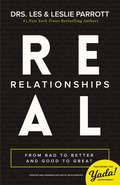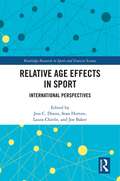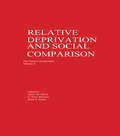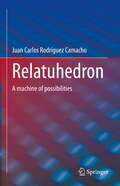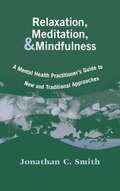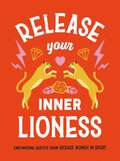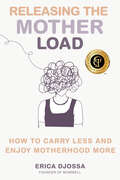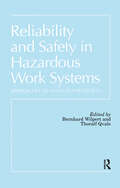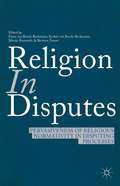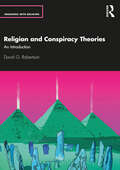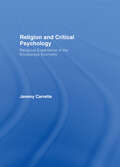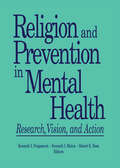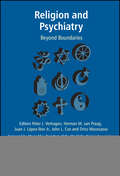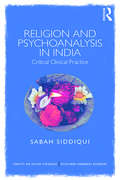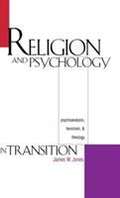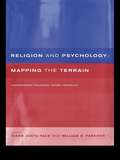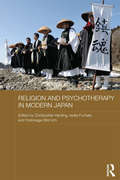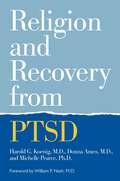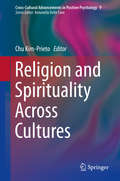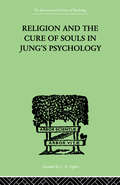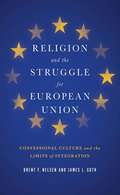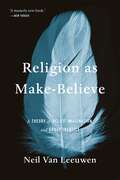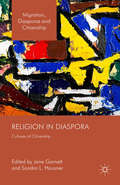- Table View
- List View
Relationships: An Open and Honest Guide to Making Bad Relationships Better and Good Relationships Great
by Les Parrott Leslie ParrottThe following quotation is taken from the back cover of the paper-back edition of this book: "Heading below the surface to the depths of human interactions, relationship experts Les and Leslie Parrott show how to make bad relationships better and good relationships great. Here are the tools you need to handle tough times and to really succeed at forging strong, rewarding relationships with friends, with the opposite sex, with family, and with God. This cutting-edge book will help you understand: Who you are and what you bring to your relationship; How your family of origin shapes the way you relate to others; How to bridge the gender gap and learn the language of the opposite sex; [It will give you] tips for building friendships that last; [It will provide you with] secrets to finding the love you long for and ... [for] handling sexual issues; [It will show you] how to handle failed friendships and breakups without falling apart; [and show you] how to relate to God without feeling phony." Even though the writers are Christian mental health professionals, they are able to relate to both Christian and non-Christian readers. Christians who want an integrated Christian-Psychological approach will find this book helpful. However, because this book is primarily secular psychology and is not a Christian Pastoral volume, readers who are more secular or who are not Christians will be able to incorporate many of the authors comments, strategies, and psychological findings into their own lives.
Relative Age Effects in Sport: International Perspectives (Routledge Research in Sport and Exercise Science)
by Joe Baker Sean Horton Jess C. Dixon Laura ChittleIndividual achievement in sport is often constrained by an athlete’s age relative to the peers with whom they participate. A common practice within sport and educational domains is to group youth based on their chronological ages to help promote equal competition, age appropriate instruction, and ensure participant safety. While well intended, such grouping practices can often advantage relatively older children, while disadvantaging those who are relatively younger within the same age cohort. These phenomena are known as Relative Age Effects (RAEs). Relative Age Effects in Sport: International Perspectives includes chapters from internationally recognized scholars who have examined RAEs from different perspectives (e.g., sport, mental health and wellbeing, youth development). This new volume assists in communicating and mobilizing knowledge and research about RAEs, focusing on developing feasible and attractive solutions that capture the attention of practitioners and policy makers from sport governing bodies and creating a resource that is accessible to professionals within the sport and academic communities. Relative Age Effects in Sport: International Perspectives is key reading for academics and researchers in the fields of athlete development, talent identification, coaching education, health and wellbeing, mental health and related disciplines, whilst also of interest to sport industry professionals such as coaches and policy makers.
Relative Deprivation and Social Comparison: The Ontario Symposium, Volume 4 (Ontario Symposia on Personality and Social Psychology Series)
by JAMES M. OLSON, C. PETER HERMAN and MARK P. ZANNAFirst published in 1986. Routledge is an imprint of Taylor & Francis, an informa company.
Relatuhedron: A machine of possibilities
by Juan Carlos Rodriguez CamachoA journey of new routes of healing with/by Indigenous and non-Indigenous participants is shared under the Two Eyed-Seeing Perspective of Elder Albert Marshall. The Universal Human Right of Indigenous self-determination and Relationality are the togetherness presented in a “mangrove tree” that lives between salty and sweet waters emerging as a protective place of rich ecosystems. The relatuhedron (shapes of relationality) a co-construction of a home, a Wigwam, Long House, Maloca, Ue, crystalizes knowledge and practices in the process of individual and community healing and cultural transactions. A set of neologisms such as relatuhedron, pedagomiologies, and social grammars, is proposed to challenge our views of mental health, healing, cultural transactions, stereotypes, recovery, and public policy and include simplicities and complexities required to support Indigenous well-being. It is a “machine of possibilities” for students and professionals working with/by and for Indigenous communities. In this book healing is presented as a process through scholarly practice and reflection. Healing is a process of emergence of meaning by improving relationality with the self, nature and others, in a practical approach to socio-cultural transformations. In sum, healing is based on individual and community processes both honoring and respective Indigenous knowledge and scientific research to create endless opportunities for well-being. This book presents healing as a process of growth, a complex, dynamic and evolutive journey of transforming how we stablish and maintain relationships with the self, nature and others inside of our cultural negotiations.
Relaxation, Meditation, and Mindfulness
by Jonathan C. SmithBased on a newly revised theory of relaxation, ABC2 Relaxation Theory, devised by the author, this book explains why hundreds of techniques used by professionals typically sort into six groups. The integration of these groups forms the core of the book. Smith's findings also reveal that not only can relaxation go beyond stress management, but that different families of relaxation have different effects. Rich with practical suggestions and concrete illustrations of application, this comprehensive training guide details the following techniques: Yoga Stretching Progressive Muscle Relaxation Breathing Exercise Autogenic Suggestion Imagery/Relaxing Self-Talk Meditation (including Mindfulness) Special applications include: relaxation with children relaxation and pain management relaxation, spirituality, and religion
Release Your Inner Lioness: Empowering Quotes from Kickass Women in Sport: Crush Your Goals, Celebrate Your Strength and Live Life to the Full
by Harriet DyerSupercharge your game and claim your victory with this powerful collection of uplifting words from kickass women in sportInside every woman is a lioness just waiting to break free. This feisty feline is independent, brave, strong and agile. She is ready to acknowledge and shout about her power. She wants to crush her goals. She believes she deserves to live her life courageously and to the full. All she needs is for you to open your heart and set her free.This small-but-mighty book is the perfect companion on your journey to attaining the unshakeable confidence of a lioness. Inside you’ll find empowering quotes from sporting legends all the way from Billie Jean King right up to Leah Williamson. Let these bold words from badass women inspire you to find your pride of supportive sisters, reach for your dreams, and celebrate every success along the way.Stay fierce and fearless – unleash your inner lioness and hear her roar!
Releasing the Mother Load: How to Carry Less and Enjoy Motherhood More
by Erica Djossa"If you've ever felt like you're the only one struggling with motherhood, this book is for you."—Eve Rodsky, New York Times bestselling author of Fair Play An empowering guide that helps you unburden the load of impossible expectations and reshapes your internalized ideals, expectations, and beliefs around motherhood.Every mom wants to be a good parent—but if you&’ve found yourself burned out and overwhelmed trying to be &“the perfect mom,&” you&’re not alone. &“We get handed a rulebook of motherhood without realizing it,&” says Canada's maternal mental health specialist and the founder and CEO of Momwell Erica Djossa. &“That rulebook comes with an invisible load—a world of mental and physical tasks that keep us pushing toward perfection while barely being able to breathe.&” Here she shares a guide to help you break free from the crushing burden of unrealistic expectations and reclaim the joy of motherhood while staying true to your own values. Join her to explore:Where the Mother Load comes from, and why it doesn&’t serve us or our childrenThe true emotional and physical cost of the many jobs, habits, and beliefs we carryTools to establish strong boundaries, express your needs, and build a support systemPractical guidance to help you create a healthy, balanced, and enriching approach to motherhood&“You can chart your own journey in a way that is freeing, feels right to you, and reignites passions and dreams that you thought had died when you began to put everyone else&’s needs first,&” says Erica Djossa. Discover a new vision of motherhood that empowers you to parent more freely and with greater fulfillment—so you can finally release the Mother Load.
Reliability and Safety In Hazardous Work Systems: Approaches To Analysis And Design
by Bernhard Wilpert Thoralf QvaleThis volume contains a selection of original contributions from internationally reputed scholars in the field of risk management in socio?technical systems with high hazard potential. Its first major section addresses fundamental psychological and socio?technical concepts in the field of risk perception, risk management and learning systems for safety improvement. The second section deals with the variety of procedures for system safety analysis. It covers strategies of analyzing automation problems and of safety culture as well as the analysis of social dynamics in field settings and of field experiments. Its third part then illustrates the utilization of basic concepts and analytic approaches by way of case studies of designing man?machine systems and in various industrial sectors such as intensive care wards, aviation, offfshore oil drilling and chemical industry. In linking basic theoretical conceptual notions and analytic strategies to detailed case studies in the area of hazardous work organizations the volume differs from and complements more theoretical works such as Human Error (J. Reason, 1990) and more general approaches such as New Technologies and Human Error (J. Rasmussen, K. Duncan, J. Leplat, Eds.)
Religion In Disputes
by Franz von Benda-Beckmann Keebet von Benda-Beckmann Martin Ramstedt Bertram TurnerHow are time-honored tenets of faith, different ritual sensibilities, and newly emerging eschatological imaginaries articulated with other normative registers and moral susceptibilities in disputes? This book examines such questions through cases in Europe, the United States, Israel, Africa, and South and Southeast Asia.
Religion That Heals, Religion That Harms
by James GriffithFrom James L. Griffith, well known for his work on harnessing the healing potential of religion and spirituality, this book helps clinicians to intervene effectively in situations where religion is causing harm. Vivid examples illustrate how religious beliefs and practices may propel suicide, violence, self-neglect, or undue suffering in the face of medical or emotional challenges. Griffith also unravels the links between psychiatric illness and distorted religious experience. He demonstrates empathic, respectful ways to interview patients who disdain contact with mental health professionals, yet whose religious lives put themselves or others at risk. The book incorporates cutting-edge research on the psychology of religion and social neuroscience.
Religion and Conspiracy Theories: An Introduction (Engaging with Religion)
by David G. RobertsonReligion and Conspiracy Theories: An Introduction is the first accessible volume to systematically examine the relationship between religion and conspiracy theories in the contemporary world in critical and historical perspective.It lays out the historical development of these important categories, considers different theoretical approaches and looks at case studies of conspiracy theories in religion, about religion and as religion. It maintains a critical perspective throughout on the relationship between truth and power, and in the process provides a fresh perspective on belief and worldviews in our modern world.Designed for use in the classroom, the book features helpful diagrams and resources for teachers. It is an essential read for all students of religion and conspiracy theories, as well as scholars of politics, religious studies, sociology, anthropology and cultural studies.
Religion and Critical Psychology: Religious Experience in the Knowledge Economy
by Jeremy CarretteJeremy Carrette argues that the psychology of religion is no longer sustainable without a social critique, and that as William James predicted, the project of the modernist psychology of religion has failed. Controversially he champions greater social and philosophical analysis within the field to challenge the political naivety and disciplinary illusions of the traditional approaches to psychology of religion. Carrette discusses the relevance of the social and economic factors surrounding the debates of psychology and religion, through three critical examples: psychoanalysis humanistic psychology cognitive neuroscience. A Critical Psychology of Religion provides a new dimension to the debates surrounding religious experience. It will be of interest to students and researchers in the fields of critical psychology, religious experience and the psychology of religion and extends an interdisciplinary challenge to the separation of psychology, sociology, politics, economics and religion.
Religion and Men's Violence Against Women
by Andy J. JohnsonThis reference offers the nuanced understanding and practical guidance needed to address domestic violence, sexual assault, and human trafficking in diverse religious communities. Introductory chapters sort through the complexities, from abusers' distorting of sacred texts to justifying their actions to survivors' conflicting feelings toward their faith. The core of the book surveys findings on gender violence across Christian, Jewish, Islamic, Eastern, and Indigenous traditions--both attitudes that promote abuse and spiritual resources that can be used to promote healing. Best practices are included for appropriate treatment of survivors, their children, and abusers; and for partnering with communities and clergy toward stemming violence against women. Among the topics featured: Ecclesiastical policies vs. lived social relationships: gender parity, attitudes, and ethics. Women's spiritual struggles and resources to cope with intimate partner aggression. Christian stereotypes and violence against North America's native women. Addressing intimate partner violence in rural church communities. Collaboration between community service agencies and faith-based institutions. Providing hope in faith communities: creating a domestic violence policy for families. Religion and Men's Violence against Women will gain a wide audience among psychologists, social workers, marriage and family therapists, and other mental health professionals who treat religious clients or specialize in treating survivors and perpetrators of domestic and intimate partner violence, stalking, sexual assault, rape, or human trafficking.
Religion and Prevention in Mental Health: Research, Vision, and Action
by Kenneth Pargament Robert E Hess Kenneth I MatonHere is the first book which highlights the unique resource of religion in the field of prevention. Until now, religious systems have been a largely undertapped resource of talent, energy, care, and physical and financial assets. Religion and Prevention in Mental Health is a significant new volume that lays a general foundation for preventive work in the religious area. It presents a number of reasons for examining religion as a source for aiding prevention and well-being. The authors dispute the popular notion of religion as damaging to mental health, as well as the idea that religious affiliation is entirely predictive of better mental health. Instead they focus on the framework for living that religions provide which assists believers in anticipating, avoiding, or modifying problems before they develop. For the human service professional willing to build a collaborative relationship with religious systems, this vital book depicts the richness and diversity of religion and shows the interface of religion, well-being, and prevention. Important issues such as the impact of religion on American society and the ethos of mental health and prevention, the historical and contemporary role of the African-American church as an empowering agent and mediating structure for black citizens, the critical roles of theology in determining the attitude of religious systems toward prevention and well-being, the importance of community and personal narratives, and the limitations of religious settings due to their survival concerns and methods to increase their potential to heal are all discussed thoroughly. Through a better understanding of religious settings, programs, and processes, human service professionals can more effectively utilize religion and reach a neglected portion of the population in need of help. In addition, religious leaders, mental health professionals including counselors, social workers, program developers, evaluators, and administrators, and psychologists, sociologists, and anthropologists will benefit from the comprehensive material provided in this timely book.
Religion and Psychiatry
by Peter Verhagen Herman M. Van Praag John Cox Juan José López-Ibor Jr. Driss MoussaouiReligion (and spirituality) is very much alive and shapes the cultural values and aspirations of psychiatrist and patient alike, as does the choice of not identifying with a particular faith. Patients bring their beliefs and convictions into the doctor-patient relationship. The challenge for mental health professionals, whatever their own world view, is to develop and refine their vocabularies such that they truly understand what is communicated to them by their patients. Religion and Psychiatry provides psychiatrists with a framework for this understanding and highlights the importance of religion and spirituality in mental well-being. This book aims to inform and explain, as well as to be thought provoking and even controversial. Patiently and thoroughly, the authors consider why and how, when and where religion (and spirituality) are at stake in the life of psychiatric patients. The interface between psychiatry and religion is explored at different levels, varying from daily clinical practice to conceptual fieldwork. The book covers phenomenology, epidemiology, research data, explanatory models and theories. It also reviews the development of DSM V and its awareness of the importance of religion and spirituality in mental health.What can religious traditions learn from each other to assist the patient? Religion and Psychiatry discusses this, as well as the neurological basis of religious experiences. It describes training programmes that successfully incorporate aspects of religion and demonstrates how different religious and spiritual traditions can be brought together to improve psychiatric training and daily practice.Describes the relationship of the main world religions with psychiatryConsiders training, policy and service deliveryProvides powerful support for more effective partnerships between psychiatry and religion in day to day clinical careThis is the first time that so many psychiatrists, psychologists and theologians from all parts of the world and from so many different religious and spiritual backgrounds have worked together to produce a book like this one. In that sense, it truly is a World Psychiatric Association publication.Religion and Psychiatry is recommended reading for residents in psychiatry, postgraduates in theology, psychology and psychology of religion, researchers in psychiatric epidemiology and trans-cultural psychiatry, as well as professionals in theology, psychiatry and psychology of religion
Religion and Psychoanalysis in India: Critical Clinical Practice (Concepts for Critical Psychology)
by Sabah SiddiquiReligion and Psychoanalysis in India questions the assumptions of an established scientific, evidence-based global mental health paradigm by examining the practices of faith-based healing. It proposes that human beings demonstrate a dual loyalty: to science as faith and faith as science, both of which get reconfigured in the process. In this particular context, science and faith are deployed in ways that are not only different but at times contrary to mainstream discourses of science and religion, and faith healing becomes a point where these two discourses collide head-on in negotiating cultural values and practices. The book addresses key questions, such as: What is the value of 'faith healing' in understanding distress and treatment in different cultural contexts? What is a critical psychological perspective on faith and religious systems? What challenges do alternative religious practices pose to critical psychology? How should we re-imagine clinical work in a context marked by science and religion? Situated between 'West' and 'East', between the global mental health movement and local faith-based practices in India, the book addresses a wide audience that includes students and researchers in psychology, cultural and medical anthropology, the sociology of religion, cultural theory, postcolonial theory, and the sociology of science. It will also appeal to policy-makers and practitioners interested in the work of NGOs and the legal frameworks driving mental health movements in India.
Religion and Psychology in Transition: Psychoanalysis, Feminism, and Theology
by James W. JonesIn this thought-provoking book, clinical psychologist and professor of religious studies James W. Jones presents a dialogue between contemporary psychoanalytic thinking and contemporary theology. He sheds new light on the interaction of religion and psychology by viewing it from the perspective of world religions, providing an epistemological framework for the psychology of religion that draws on contemporary philosophy of science, and bringing out the importance of gender as a category of analysis. Developments in psychoanalysis provide new resources for theological reflection, Jones contends. The Freudian view that human nature is isolated and instinctual has shifted to a vision of the self as constituted in and through relationships. Jones uses this relational model of human nature to explore the convergence between contemporary psychoanalysis, feminist theorizing, and themes in religious thought found in a variety of traditions. He also critiques the reductionism inherent in Freud's discussion of religion and proposes nonreductionistic and genuinely psychoanalytic ways for psychoanalysis to treat religious topics. For therapists, psychologists, theologians, and others interested in spiritual or psychological issues, Jones offers illuminating clinical material and insightful analysis.
Religion and Psychology: Mapping the Terrain
by Diane Jonte-Pace William B. ParsonsReligion and Psychology is a thorough and incisive survey of the current relationship between religion and psychology from the leading scholars in the field. This is an essential resource for students and researchers in the area of psychology of religion. Issues addressed are:* The Psychology-Theology Dialogue* The Psychology-Comparativist Dialogue* Psychology, Religion and Gender Studies* Psychology "as" Religion* Social Scientific Approaches to the Psychology of Religion* The Empirical Approach* International Perspectives
Religion and Psychotherapy in Modern Japan (Routledge Contemporary Japan Series)
by Christopher Harding Iwata Fumiaki Yoshinaga Shin’ichiSince the late nineteenth century, religious ideas and practices in Japan have become increasingly intertwined with those associated with mental health and healing. This relationship developed against the backdrop of a far broader, and deeply consequential meeting: between Japan’s long-standing, Chinese-influenced intellectual and institutional forms, and the politics, science, philosophy, and religion of the post-Enlightenment West. In striving to craft a modern society and culture that could exist on terms with – rather than be subsumed by – western power and influence, Japan became home to a religion--psy dialogue informed by pressing political priorities and rapidly shifting cultural concerns. This book provides a historically contextualized introduction to the dialogue between religion and psychotherapy in modern Japan. In doing so, it draws out connections between developments in medicine, government policy, Japanese religion and spirituality, social and cultural criticism, regional dynamics, and gender relations. The chapters all focus on the meeting and intermingling of religious with psychotherapeutic ideas and draw on a wide range of case studies including: how temple and shrine ‘cures’ of early modern Japan fared in the light of German neuropsychiatry; how Japanese Buddhist theories of mind, body, and self-cultivation negotiated with the findings of western medicine; how Buddhists, Christians, and other organizations and groups drew and redrew the lines between religious praxis and psychological healing; how major European therapies such as Freud’s fed into self-consciously Japanese analyses of and treatments for the ills of the age; and how distress, suffering, and individuality came to be reinterpreted across the twentieth and early twenty-first centuries, from the southern islands of Okinawa to the devastated northern neighbourhoods of the Tohoku region after the earthquake, tsunami, and nuclear disasters of March 2011. Religion and Psychotherapy in Modern Japan will be welcomed by students and scholars working across a broad range of subjects, including Japanese culture and society, religious studies, psychology and psychotherapy, mental health, and international history.
Religion and Recovery from PTSD
by Harold Koenig Donna Ames Michelle PearceThis volume focuses on the role that religion and spirituality can play in recovery from post-traumatic stress disorder (PTSD) and other forms of trauma, including moral injury. Religious texts, from the Bible to Buddhist scriptures, have always contained passages that focus on helping those who have experienced the trauma of war. Many religions have developed psychological, social, behavioral, and spiritual ways of coping and healing that can work in tandem with clinical treatments today in assisting recovery from PTSD and moral injury.In this book the authors review and discuss systematic research into how religion helps people cope with severe trauma, including trauma caused by natural disasters, intentional interpersonal violence, or combat experiences during war. They delve into the impact that spirituality has in both the development of and recovery from PTSD. Beyond reviewing research, they also use case vignettes throughout to illustrate the very human story of recovery from PTSD, and how religious or spiritual beliefs can both help or hinder depending on circumstance. A vital work for any mental health or religious professionals who seek to help people dealing with severe trauma and loss.
Religion and Spirituality Across Cultures
by Chu Kim-PrietoThis book presents an integrated review and critical analysis of the recent research in the positive psychology of religion, with focus on the positive psychology of religion across different cultures and religions. The book provides a review of the literature on different contributions of religion and spirituality to positive functioning and well-being and reviews religions across the world, including Christianity, Islam, Buddhism, Judaism, Sikhism, Native American religions, and Hinduism It fills a unique place in the market's increasing interest and demand in the psychology of religion, as well as positive psychology. While the target audience is researchers, scholars, and students in psychology, cross-cultural studies, religious studies, and social sciences, it will be useful for anyone interested in better understanding the contributions of religion and culture in subjective well-being.
Religion and the Cure of Souls In Jung's Psychology (International Library Of Psychology Ser.)
by Hans SchaerRoutledge is now re-issuing this prestigious series of 204 volumes originally published between 1910 and 1965. The titles include works by key figures such asC.G. Jung, Sigmund Freud, Jean Piaget, Otto Rank, James Hillman, Erich Fromm, Karen Horney and Susan Isaacs. Each volume is available on its own, as part of a themed mini-set, or as part of a specially-priced 204-volume set. A brochure listing each title in the "International Library of Psychology" series is available upon request.
Religion and the Struggle for European Union: Confessional Culture and the Limits of Integration (Religion and Politics)
by Brent F. Nelsen James L. Guth<p>In <i>Religion and the Struggle for European Union</i>, Brent F. Nelsen and James L. Guth delve into the powerful role of religion in shaping European attitudes on politics, political integration, and the national and continental identities of its leaders and citizens. <p>Nelsen and Guth contend that for centuries Catholicism promoted the universality of the Church and the essential unity of Christendom. Protestantism, by contrast, esteemed particularity and feared Catholic dominance. These differing visions of Europe have influenced the process of postwar integration in profound ways. Nelsen and Guth compare the Catholic view of Europe as a single cultural entity best governed as a unified polity against traditional Protestant estrangement from continental culture and its preference for pragmatic cooperation over the sacrifice of sovereignty. As the authors show, this deep cultural divide, rooted in the struggles of the Reformation, resists the ongoing secularization of the continent. Unless addressed, it threatens decades of hard-won gains in security and prosperity. <p>Farsighted and rich with data, <i>Religion and the Struggle for European Union</i> offers a pragmatic way forward in the EU's attempts to solve its social, economic, and political crises.
Religion as Make-Believe: A Theory of Belief, Imagination, and Group Identity
by Neil Van LeeuwenTo understand the nature of religious belief, we must look at how our minds process the world of imagination and make-believe.We often assume that religious beliefs are no different in kind from ordinary factual beliefs—that believing in the existence of God or of supernatural entities that hear our prayers is akin to believing that May comes before June. Neil Van Leeuwen shows that, in fact, these two forms of belief are strikingly different. Our brains do not process religious beliefs like they do beliefs concerning mundane reality; instead, empirical findings show that religious beliefs function like the imaginings that guide make-believe play.Van Leeuwen argues that religious belief—which he terms religious “credence”—is best understood as a form of imagination that people use to define the identity of their group and express the values they hold sacred. When a person pretends, they navigate the world by consulting two maps: the first represents mundane reality, and the second superimposes the features of the imagined world atop the first. Drawing on psychological, linguistic, and anthropological evidence, Van Leeuwen posits that religious communities operate in much the same way, consulting a factual-belief map that represents ordinary objects and events and a religious-credence map that accords these objects and events imagined sacred and supernatural significance.It is hardly controversial to suggest that religion has a social function, but Religion as Make-Believe breaks new ground by theorizing the underlying cognitive mechanisms. Once we recognize that our minds process factual and religious beliefs in fundamentally different ways, we can gain deeper understanding of the complex individual and group psychology of religious faith.
Religion in Diaspora: Cultures of Citizenship (Migration, Diasporas and Citizenship)
by Sondra L. Hausner Jane GarnettThis edited collection addresses the relationship between diaspora, religion and the politics of identity in the modern world. It illuminates religious understandings of citizenship, association and civil society, and situates them historically within diverse cultures of memory and state traditions.
